Eccentrics
Dr. Seuss House, Alaska
Video should start at the proper segment. Otherwise, minute 41.
Posted By: Paul - Sun Mar 20, 2022 -
Comments (0)
Category: Architecture, Eccentrics
Desert Christ Park
Their homepage.
Posted By: Paul - Wed Mar 09, 2022 -
Comments (0)
Category: Eccentrics, Fairs, Amusement Parks, and Resorts, Religion, 1950s
Druid Priest William Price
Dr. William Price (1800-1893) led a highly eccentric life. Some details from an article about him on bbc.co.uk:- He "ate no meat, drank mainly champagne, eschewed the wearing of socks and prescribed a vegetarian diet for his patients instead of medicine."
- He had a liking for outlandish costume, "notably a fox-skin headdress with the legs and tails hanging down over his shoulders and back."
- "He became fascinated by the old druidic rites and even held druidic ceremonies at the rocking stone outside Pontypridd."

Price in 1884 wearing his druid attire. Source: MarkBerePeterson.com
However, his main claim to fame is that he helped to bring about the legalization of cremation in Britain.
Supporters of cremation had been trying to get it legalized throughout the nineteenth century. But Price caused the issue to come to a head by burning the body of his five-month-old son, Jesus Christ, on a funeral pyre, after the child had died a natural death. Yes, he had named his son Jesus Christ, or "Iesu Grist" in Welsh.
Price was arrested and charged with the crime of illegal cremation. His eventual acquittal led directly to the passage of the Cremation Act, which made it legal to burn bodies in Britain.
When Price himself died in 1893 he was cremated on a giant funeral pyre as thousands of spectators watched.
However, it's worth noting that while cremation is now legal (and commonplace) in the UK and USA, open-air pyres aren't legal, as far as I know.
More info: wikipedia
Posted By: Alex - Fri Mar 04, 2022 -
Comments (1)
Category: Death, Eccentrics, Nineteenth Century
The Automatic Human Jukebox
For many years, beginning around 1972, Grimes Poznikov entertained crowds at San Francisco's Fisherman's Wharf by transforming himself into the "Automatic Human Jukebox."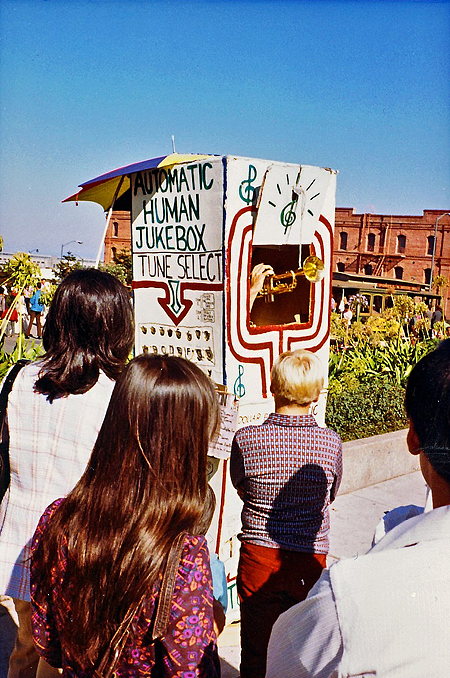
source: wikipedia
Some details about him from a 1975 syndicated article by reporter Philip Hager (The Spokane Spokesman-Review - Sep 14, 1975):
For three years, he has been delighting the throngs of visitors to Fisherman's Wharf and Ghiardelli Square, popping out of a box the size of a telephone booth to offer such selections as "Sentimental Journey," "When the Saints Go Marching In," and, inevitably, "I Left My Heart in San Francisco."
But even as a minor institution in a city with a deserved reputation for unorthodoxy, Grimes Poznikov, the Automatic Human Jukebox, has found himself facing an unceremonious eviction from the streets of San Francisco.
Poznikov's problem is that he has been cited for occupying a public street without a permit, a charge he intends to fight before a jury.
In recent weeks, seeking that elusive permit, he has been turned down by the city's Public Works Department, the Recreation and Parks Department, the Art Commission and, finally, the Board of Permit Appeals.
As a streetcorner jukebox, he doesn't fit into a tidy official category.
"I'm in a gray area, somewhere between a musician and a street artist," he explained. "The Public Works Department pointed out that under their rules I wasn't a building either."
During the height of the tourist season, Poznikov almost every day erects his seven-foot-high jukebox on the corner of Beach and Larkin, using a wire cord to anchor the structure to a nearby maple tree.
Passersby are invited to make a selection from a list of tunes Poznikov has mastered and drop in a coin. ("AHJ practices no economic discrimination," a sign announces. "However, quality... will vary automatically with the quantity of coins inserted.")
In his paper Poznikov has recorded his observations of his customers during what he calls three years worth of "ongoing demonstration of mass psychotherepeutic implementation," noting such details as "... a five to 35 second raucous laughter follows most AJH actuations."
Passersby, he has written, first refer to the jukebox in "non-personified pronoun terms" ("it") then, upon his emergence horn in hand, they speak of it as a "living component" ("he").
Poznikov regards the Automatic Human Jukebox as an experimental art form, patiently explaining to a puzzled questioner, "I want to legitimize and advance the system of non-verbal communication... the people who come here can interact with the jukebox, participate in the process of making music."
According to wikipedia, he ended up dying homeless on the streets in 2005. His life inspired a short opera titled Broken Jukebox which premiered in Jan 2008 at College of Marin.
Posted By: Alex - Mon Feb 21, 2022 -
Comments (2)
Category: Eccentrics, Outsiders, Marginals, the Excluded and Low-castes, Music, Performance Art, 1970s
Brainbeauism
While serving in World War II, Lt. George E. Lemon suffered a head injury from a jeep accident. As he described it, this gave his brain a "tilt" which resulted in a "me-to-me talkathon" and ended with him realizing "the only way to end war, inflation, unemployment, trade deficits and death."Lemon stewed on his realization for almost four decades until he retired in the 1980s. Then he renamed himself J.C. Brainbeau and began placing classified ads in various magazines offering to share his comprehensive "4 WAY PEACE PLAN" with anyone who sent him a self-addressed stamped envelope. Those who responded to him, however, just received more ads.
Donna Kossy offers some analysis in her book Kooks: A Guide to the Outer Limits of Human Belief:
For Brainbeau, the ads themselves were esoteric truths. Those who sent Self Addressed Stamped Envelopes (SASE) to Brainbeau expecting to receive literature, products or information received even more ads! They revealed Brainbeau's plans, bit by bit, ad by ad. Several sheets of closely spaced Brainbeau ads could be fit together like a jigsaw puzzle, but the resulting picture would be just another sheet of ads.
I figured someone on the Internet would have archived Brainbeau's bizarro ads. But I found nothing. So below are some of his ads that Kossy reproduced in her book.
You can read more about Brainbeau at Kossy's Kook Museum, which is now archived at the Wayback Machine.


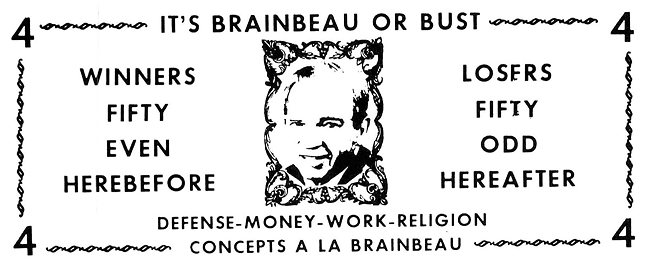
Posted By: Alex - Wed Feb 02, 2022 -
Comments (3)
Category: Eccentrics, Crackpots, Advertising
The 1000-Mile Courtroom

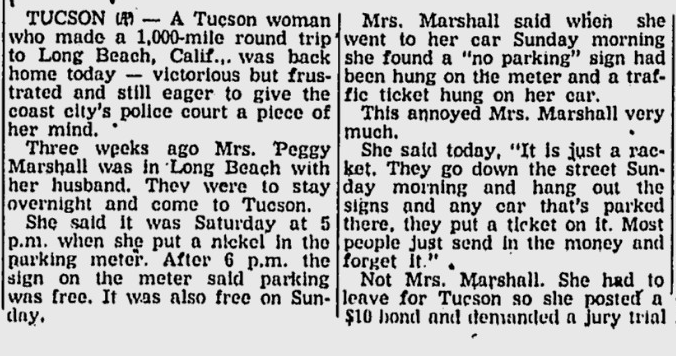
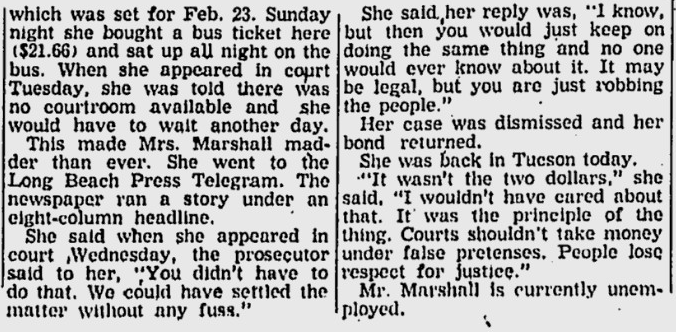
Source.
Posted By: Paul - Tue Jan 25, 2022 -
Comments (5)
Category: Eccentrics, Law, Money, Outrageous Excess, Police and Other Law Enforcement, 1950s, Cars
Grandma Prisbey’s Bottle Village
The official website.Many more pics here.

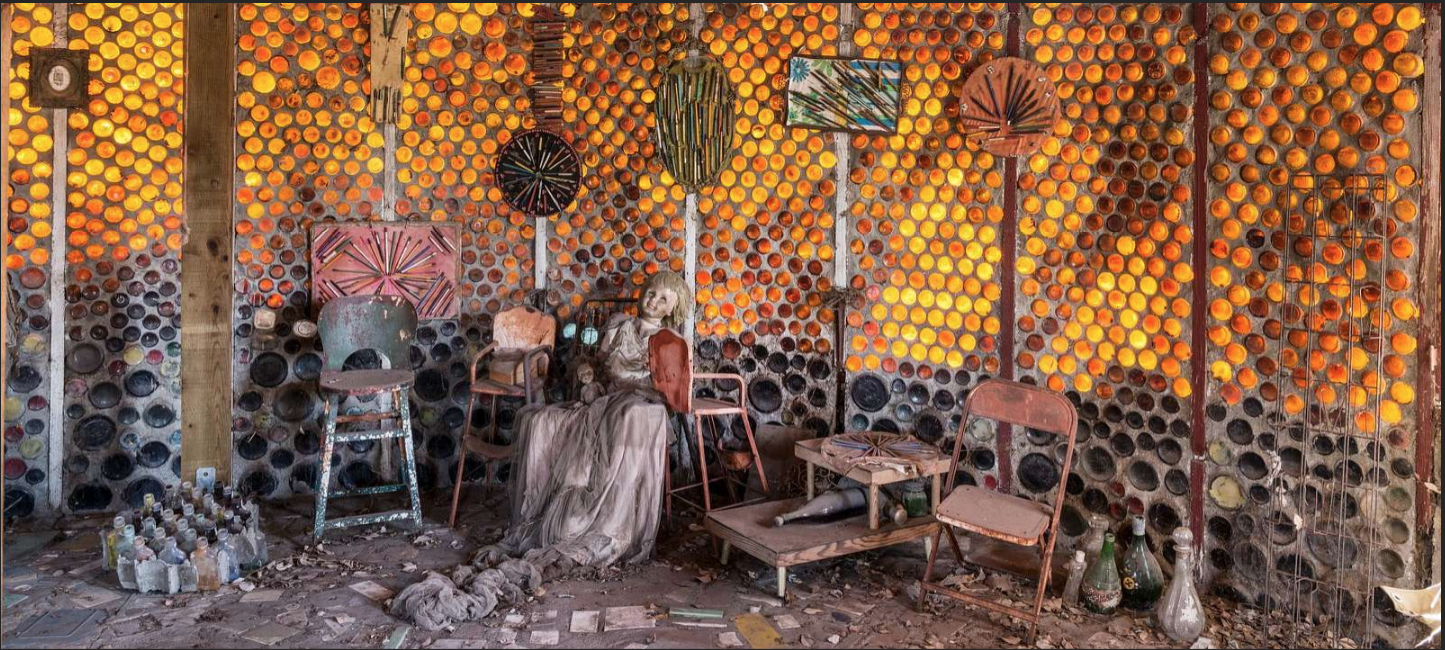
Posted By: Paul - Sun Jan 23, 2022 -
Comments (0)
Category: Architecture, Eccentrics, Regionalism, Twentieth Century
Lily & Maria
"I knew the shape of thirsty flowers..."
Their Wikipedia page.
Posted By: Paul - Mon Jan 10, 2022 -
Comments (0)
Category: Eccentrics, Bohemians, Beatniks, Hippies and Slackers, Fey, Twee, Whimsical, Naive and Sadsack, Music, 1960s
Hube the Cube, Professional Beatnik
Read of Hube the Cube's unique job in the final paragraphs of the article below.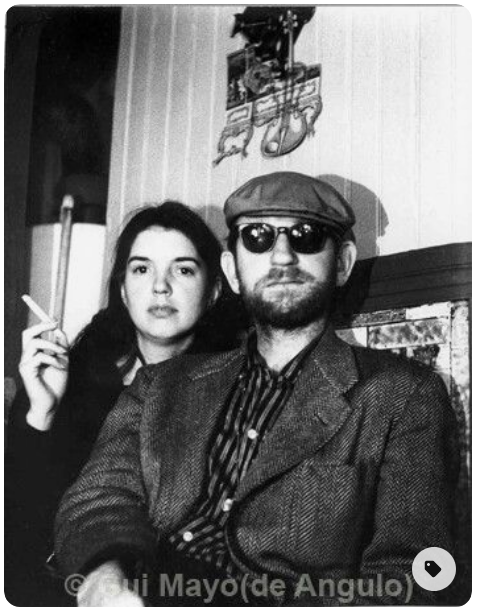
(Artists Jane Belson & Hubert "Hube the Cube" Leslie)
Newspaper source: Lansing State Journal (Lansing, Michigan) 01 Sep 1960, Thu Page 7
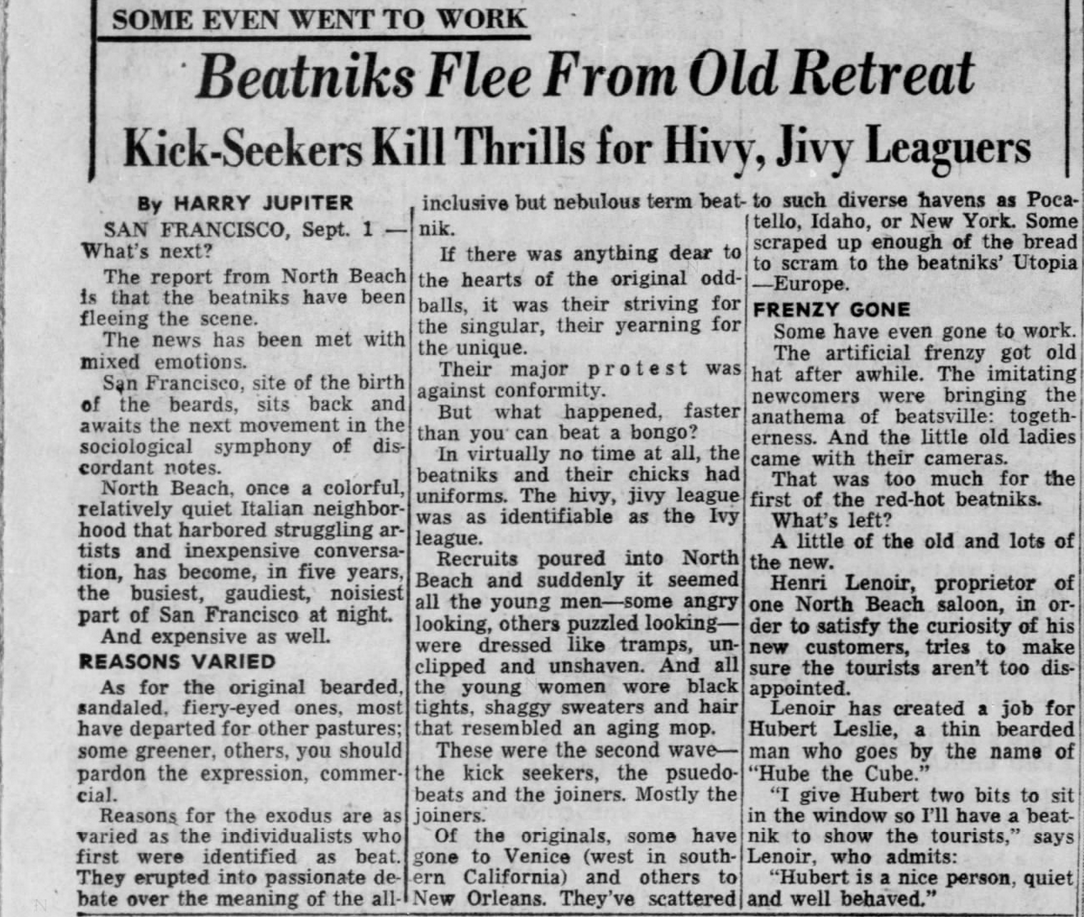
A very interesting short memoir by a fellow who hung out with Hube.
Posted By: Paul - Sat Dec 18, 2021 -
Comments (1)
Category: Drugs, Eccentrics, Bohemians, Beatniks, Hippies and Slackers, Cafes, Coffeehouses, Teahouses, and Other Caffeine Culture, 1950s, 1960s
Jim Gernhart, the living corpse
In 1951, Jim Gernhart, having recently retired, decided to hold a rehearsal of his own funeral. He kept rehearsing it each subsequent year for 25 years, until finally (still alive) he gave up. Because of this annual ritual he became known as Colorado's "living corpse".He eventually died in 1980 at the age of 103.
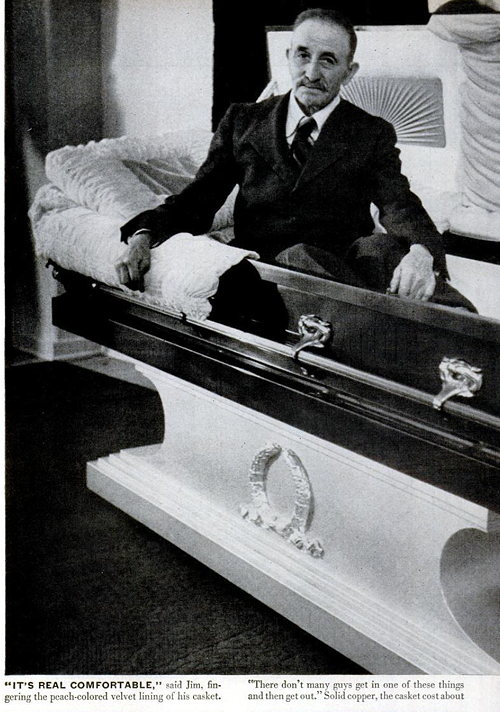
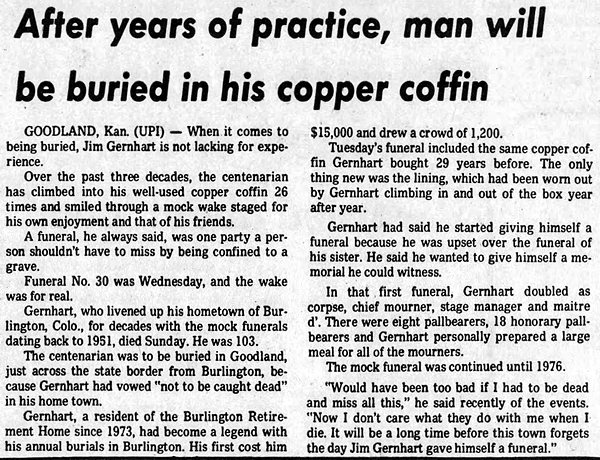
Tampa Tribune - Jan 24, 1980
Posted By: Alex - Tue Nov 30, 2021 -
Comments (7)
Category: Death, Eccentrics

| Who We Are |
|---|
| Alex Boese Alex is the creator and curator of the Museum of Hoaxes. He's also the author of various weird, non-fiction, science-themed books such as Elephants on Acid and Psychedelic Apes. Paul Di Filippo Paul has been paid to put weird ideas into fictional form for over thirty years, in his career as a noted science fiction writer. He has recently begun blogging on many curious topics with three fellow writers at The Inferior 4+1. Contact Us |




